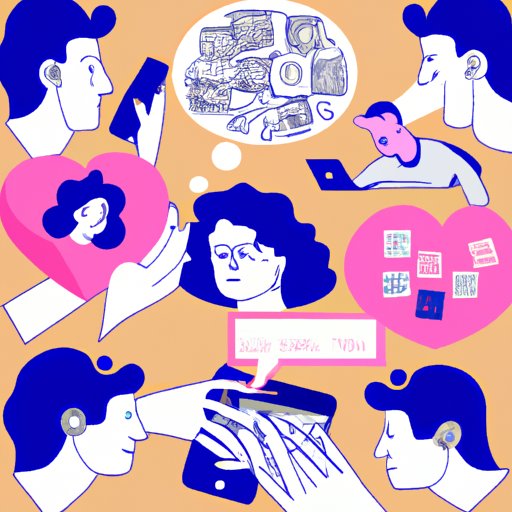Introduction
Technology is rapidly changing the way we think, interact, and live. From apps that monitor our mental health, to social media platforms that connect us with people around the world, technology is having a profound effect on our psychological well-being. This article will explore the impact of technology on psychology, looking at both the positive and negative effects it has on our mental health, social relationships, attention spans, problem solving skills, emotions, and sleep patterns.

Positive Effects of Technology on Mental Health
One of the most significant benefits of technology is its ability to improve access to mental health services. According to the American Psychological Association (APA), telehealth services are becoming increasingly popular as they offer convenient and accessible options for individuals seeking mental health support. These services allow people to access professional help from the comfort of their own homes, without the need for an in-person visit. Technology can also be used to help monitor mental health, such as through apps that track moods, symptoms, and medication adherence. Furthermore, technology can be an important tool for connecting people with support networks, such as online support groups or chat rooms.
Negative Effects of Technology on Mental Health
Unfortunately, technology can also have a negative impact on mental health. Increased stress and anxiety levels can result from being constantly connected to work or school via technology. Additionally, the use of social media can lead to feelings of comparison and envy, which can further contribute to mental health issues. Cyberbullying is another concern, as technology makes it easier for people to spread hurtful messages anonymously. This can lead to increased feelings of isolation and depression.

Impact of Technology on Social Relationships
The use of technology has changed the way we communicate with each other. Digital communication, such as text messaging and social media, has become increasingly popular, resulting in less face-to-face interaction. While digital communication does provide an easy and convenient way to stay in touch with friends and family, it can also make it more difficult to develop and maintain meaningful relationships. Research conducted by the Pew Research Center found that 45% of teens felt like their peers were distracted by their phones during conversations.
Effect of Technology on Attention Spans
Notifications and alerts can be constant distractions, making it difficult to focus on tasks that require sustained attention. This can have a particularly strong impact on younger generations, who are more likely to be exposed to technology at an earlier age. As noted by Dr. Adam Gazzaley, a professor of neurology at the University of California San Francisco, “The human brain is not designed to multitask or handle multiple streams of information at once.” He goes on to say that “our brains can become fatigued and overwhelmed when we try to do too much at once.”
Influence of Technology on Problem Solving
The overreliance on technology to provide solutions can lead to a reduction in creative thinking and problem solving skills. This can be seen in the decline of basic math skills among students, as many rely on calculators rather than using their own mental calculations. Furthermore, technology can reduce critical thinking skills, as people become accustomed to relying on search engines or other sources to provide answers to their questions.

Impact of Technology on Emotions
The use of technology can have a negative impact on our emotions. Studies have shown that there is an increase in negative emotions associated with technology use, such as loneliness, anger, and frustration. Furthermore, the use of technology can lead to a decrease in emotional intelligence, as people become less adept at recognizing and responding to emotions. This can lead to difficulty in forming meaningful relationships.

Impact of Technology on Sleep Patterns
The blue light emitted from devices can interfere with our circadian rhythms, leading to disruption of sleep patterns. Additionally, late night technology use can reduce the quality of sleep, as people become so absorbed in their devices that they don’t get enough rest. This can lead to an increased risk of insomnia, as well as other physical and mental health issues.
Conclusion
In conclusion, technology has had a major impact on psychology, both positively and negatively. On the one hand, technology can improve access to mental health services and connect people with support networks. On the other hand, technology can lead to increased stress and anxiety levels, social media comparison and envy, and cyberbullying. It can also have a negative effect on social relationships, attention spans, problem solving skills, emotions, and sleep patterns. To ensure that technology is used in a healthy and beneficial way, it is important to manage technology use in order to ensure that it does not have a detrimental effect on mental health, social relationships, problem solving skills, and sleep patterns.
(Note: Is this article not meeting your expectations? Do you have knowledge or insights to share? Unlock new opportunities and expand your reach by joining our authors team. Click Registration to join us and share your expertise with our readers.)
